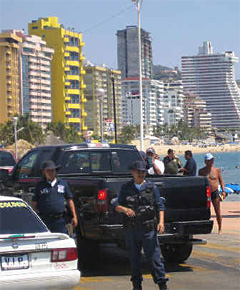 |
 |
 |
 News Around the Republic of Mexico | March 2007 News Around the Republic of Mexico | March 2007  
Mexico Drug Violence Escalates
 Jeremy Schwartz - Cox News Service Jeremy Schwartz - Cox News Service


| | In an attempt to halt the bloodshed in a war between rival drug cartels, Mexican police have begun random vehicle inspections on the beach at Acapulco. (Jeremy Schwartz/Cox News Service) |
ACAPULCO, Mexico - On the sun-kissed beach, women paraded by in bikinis, vendors sold cheap bracelets to the tourists and heavyset men in Speedos sipped margaritas.

On the boardwalk, though, machine gun-wielding members of Mexico’s elite federal police force pulled over cars for random inspections, stopped city buses and checked trunks and IDs.

More than 250 people were executed last year in Acapulco as the sweltering Pacific resort became the latest battleground between rival cartels battling for supremacy of the multibillion-dollar drug trade.

After what experts called a decade of paralysis, corruption and inefficiency, newly elected President Felipe Calderon has sent 20,000 Mexican military and federal troops to six states to confront the drug cartels.

It remains to be seen whether Calderon’s operations, the defining action of his young administration, will restore law and order or are a publicity gambit, as his critics allege.

What is more clear is that as the war between the Matamoros-based Gulf Cartel and the Sinaloa Cartel plunges into its third year, Mexico has passed into a stage of violence unprecedented in the nation’s modern history.

Police are gunned down inside their own headquarters, the executions videotaped by gloating hit men. Traffickers are decapitated, their heads spilled across dance floors as warnings. Federal legislators are sprayed with bullets. Singers are murdered after concerts. Former safe harbors such as Monterrey have become battlefields. Beach resorts have become militarized zones.

“The Mexican state wasn’t ready for this war,” said Jorge Chabat, a Mexico City analyst who specializes in criminal justice. “The narco-traffickers have traditionally lived in their own dimension, with their own laws. Until recently, the narcos didn’t leave that dimension. Now we’re seeing them leaving, like ghosts leaving a haunted house.”

Drug violence is nothing new in Mexico. What is extraordinary is the extreme violence of recent months.

Luis Astorga, a sociology professor at Mexico City’s National Autonomous University, said that the Gulf Cartel, with its armed wing of former army officers known as Zetas, has accelerated the level of destruction.

“It’s part of the psychological war, which they learned in the counter-insurgency while they were in the military,” he said. “They’re killing machines without ethical brakes. In the old days, they put heads on spears to paralyze their adversary. But (the Gulf Cartel’s) rivals have the same logic, so they’ve entered a violent spiral.”

Few people expect Calderon to dismantle the cartels or even seriously weaken them.

“He’s trying to establish a minimum of order,” Chabat said. “He’s sending a message that someone is in charge.”

Calderon has earned praise from the Bush administration for his firm stance against the cartels and for extraditing some top drug lords, including Osiel Cardenas, who was running the Gulf Cartel from his maximum-security prison cell.

The operations are widely seen as a stopgap. The Mexican government has neither the manpower nor money to keep them going indefinitely.

So far the operations have met with mixed success. Even critics acknowledge that soldiers have brought order to some far-flung pockets that have long existed beyond the rule of law. And while experts warn that it is too early to tell, it seems that the blistering pace of drug killings — more than 2,000 in 2006 — has slowed since the military was unleashed. | 
 | |
 |



